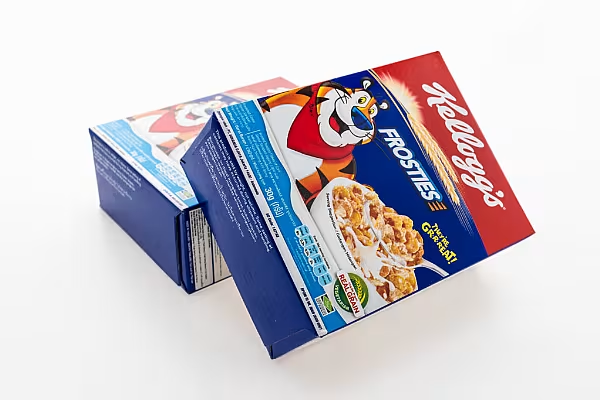Kellogg Co.'s newly minted CEO Steve Cahillane signed off on a $600 million deal for protein bars just four days into the job, a purported message to investors that this isn't the same uninspired cereal company they'd given up on. But it's far too soon to make that claim -- after all, it's the part after the acquisitions that Kellogg hasn't been very good at.
This month's RXBAR transaction is its third-largest, following Pringles in 2012 and Keebler in 2001, but neither instills much confidence.
Kellogg, the leader in North America's shrinking cereal market, has done little in the way of major innovation for Pringles or Keebler as consumers shun sugary, processed foods in favor of fresher, healthier choices. It's also owned Kashi granola bars and Morningstar veggie burgers for nearly two decades, brands that should be dominating current trends. Instead, all have lost market share in recent years under Kellogg's watch, giving way to new entrants:
Cahillane says RXBAR fits with Kellogg as "we pivot to growth," a sign that his fix for the company involves more deals. But is it too little too late?
Acquisition Strategy
RXBAR -- with its cheeky list of minimal ingredients placed prominently on its front label ("3 egg whites, 6 almonds, 2 dates, no B.S.") -- is expected to bring in $120 million of sales this year, but Kellogg said itself that the purchase will be immaterial to earnings next year. These small acquisitions of growing brands only work if Kellogg can keep growing them significantly, and history shows it can't.
Kellogg, which also makes Eggo waffles and Pop-Tarts, is set to report third-quarter earnings on Oct. 31, and the results may do more to spook shareholders than reassure them. Analysts predict revenue dropped 1.6 percent to $3.2 billion, marking an 11th consecutive period of declines. Its stock has already fared worse over the last two years than every other U.S. packaged-food giant, including the equally beleaguered Campbell Soup Co., as well as General Mills Inc., another cereal giant that's been diversifying through moves like its smart deal for Annie's organic mac-and-cheese and investment in Kite Hill nut-based dairy alternatives.
Zero-based budgeting -- in which costs must be scrupulously justified each quarter -- has helped Kellogg (and some of its competitors) preserve margins. While it's not a bad way to manage expenses, it's also become the industry's fallback for creating growth, and it can only work for so long. At some point, revenue needs to get back on track for true growth to resume.
Pricing Pressure
There's even more urgency now as discounters such as Wal-Mart Stores Inc. ramp up pricing pressure in the wake of competition from Amazon.com Inc., which now owns Whole Foods Market. On top of all that, cereal -- the product most associated with the Kellogg name -- is looking worse and worse:
The quickest way for Kellogg to transform into a more modern foodmaker is through acquisitions, but even that is a slow process, not to mention costly. Food startups and on-trend brands have been fetching absurdly rich valuations in many cases, and Kellogg's net leverage already exceeds that of most peers. One obvious next target in the industry is Hain Celestial Group Inc., a $3.8 billion maker of natural and organic foods. But I'm not sure buying the entire company makes sense for Kellogg, nor is it in the company's nature to spend so much at once.
Any hope rests on Cahillane, 52, who comes from the vitamin company Nature's Bounty and before that helped Coca-Cola Co. add alternatives to soda. Can he now help Kellogg l'eggo the Eggo and embrace today's shopper? It's a tall order and a few years late.
News by Bloomberg, edited by ESM. Click subscribe to sign up to ESM: The European Supermarket Magazine.














